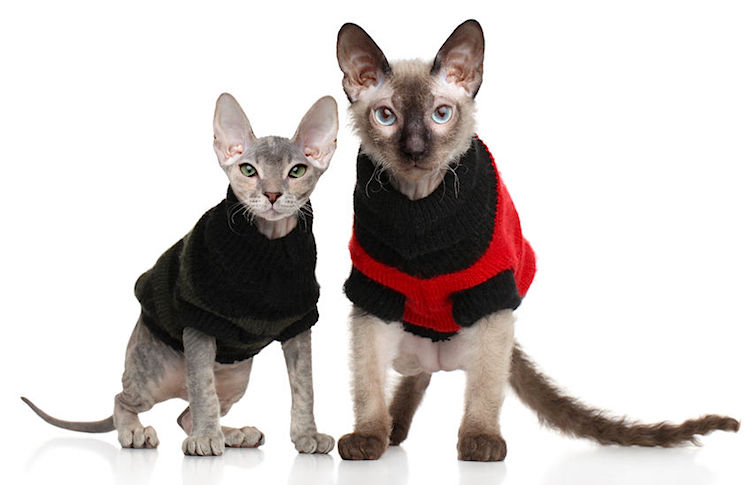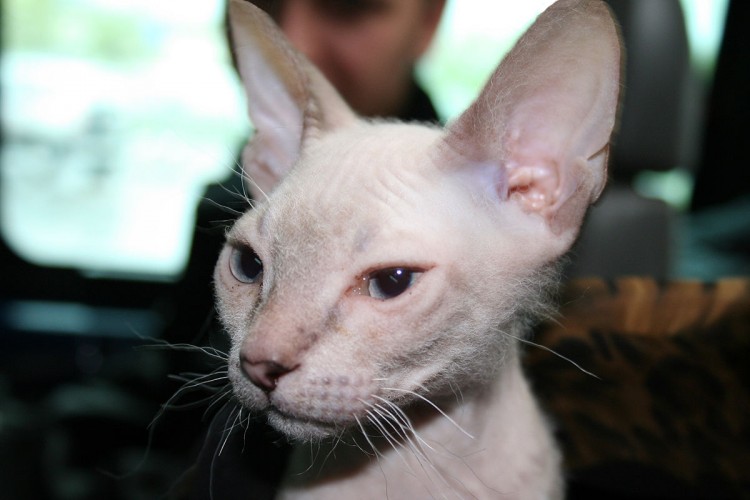
Origins of the Donskoy Cat
Donskoys were discovered in Rostov-on-Don, Russia, in 1987 by Elena Kovaleva.
- Kovaleva rescued a kitten named Varvara, who lost her hair over time.
- Efforts to treat Varvara’s skin were unsuccessful, and her kittens also lost their hair.
- Initial belief was that hair loss was due to illness or disease, leading to little interest in the cats.
A professional breeder, Irina Nemikina, later rescued one of Varvara’s kittens and began a breeding program. This led to the establishment of the Donskoy breed.
- Nemikina named the breed Don Sphynx, referencing the nearby Don River and the hairlessness akin to the Sphynx.
- The World Cat Federation recognized the breed in 1987.
- The International Cat Association added the breed in 2005.
Key Characteristics of Donskoy Cats
- Height: Unspecified
- Weight: 6–12 pounds
- Life expectancy: 12–15 years
The Donskoy, also known as Don Sphynx, Russian Donskoy, Don Hairless, and Russian Hairless, is a medium-sized, muscular cat with little to no hair and wrinkled skin.
- Feet: Oval-shaped with long, slim, webbed toes.
- Head: Wedge-shaped, flanked by long, large ears, and almond-shaped eyes. Eye colors vary.
Coat Types:
- Rubber Bald: Born bald and stays bald.
- Flocked: Appears hairless and feels like a chamois. The cat may become bald.
- Velour: Born with a bald spot on the head; hair gradually disappears but may remain on the face, legs, and tail.
- Brush: Retains more hair; bald spots may occur. Hair can be soft or wiry.
The coat is similar to human skin. Additionally, Donskoy cats can grow a winter coat, usually on the chest and tail, which they shed when the weather warms up.
Unique Traits of Donskoy Cats
Donskoy cats possess several unique traits that distinguish them from other cat breeds.
- Hairlessness: These cats are primarily hairless, with some having minimal hair on certain parts of their bodies. Their skin feels warm and soft, often compared to human skin.
- Webbed Toes: Donskoy cats have long, slim, webbed toes, which add to their distinctive appearance.
- Wrinkled Skin: The lack of fur often reveals wrinkles, especially around the head and neck.
- Playful Nature: Donskoys are known for their playful and energetic personalities. They enjoy games like fetch and hide-and-seek.
- Dog-like Loyalty: These cats exhibit a loyalty often compared to that of dogs, forming strong bonds with their owners.

The Friendly Nature of Donskoy Cats
Donskoy cats are known for their friendly and intelligent nature, making them easy to train and a joy to have around.
- Intelligence: These cats are quick learners, which makes training them relatively simple.
- Affectionate and Social: Donskoys are affectionate and enjoy being around people and other pets. However, they might not always get along with other cats.
Donskoy cats require significant attention and interaction, making them less suitable for first-time cat owners or individuals who are away from home for long periods.
- Attention Needs: They do not do well when left alone for extended periods and need a lot of attention and interaction.
- Loyalty: Their loyalty is often compared to that of dogs, showcasing their strong bond with their owners.
For more on socializing cats, check out this guide on how to socialize kittens.
Here’s some more information on this friendly, playful breed:
Is the Donskoy the Right Cat for You?
Exercise Needs

MEDIUM: There’s no denying that Donskoys are more active than most cats, but they can sleep a fair amount, too.
- Activity Level: Medium. Donskoys are more active than most cats but still enjoy their fair share of sleep. They love playing fetch and hide-and-seek.
- Indoor Life: Keep your Donskoy indoors to avoid temperature extremes and potential theft, as they are a rare breed. Their friendly nature might also mean they do not assess dangers properly.
Grooming Needs

LOW: Being hairless or nearly hairless, Donskoys have different grooming needs than those of most cats.
- Daily Wipe Down: The body produces oils that need to be wiped down daily to prevent skin problems.
- Bathing: Bathe your Donskoy once per month or more frequently as needed. Baths and wipe-downs help maintain skin health.
- Ear Cleaning: Clean their large ears weekly to remove debris and wax buildup and prevent infections.
- Toothbrushing: Essential to prevent gum disease and tooth decay.
For more on grooming, read about why cats hate water and how to brush your cat’s teeth.
Health Problems

LOW: Possible health problems include:
- Sunburn
- Skin problems
- Sensitivity to temperature extremes
- Gum disease
- Tooth decay
Due to their higher body temperature, Donskoys eat more than most cats, especially in winter to maintain body heat. Food intake should normalize once winter ends.
Caring for a Donskoy Cat
Caring for a Donskoy cat involves specific routines to ensure their well-being.
- Grooming:
- Daily Wipe Down: Use a damp cloth to wipe down your Donskoy daily to remove excess oils.
- Monthly Baths: Bathe your cat once a month to maintain skin health. More frequent baths might be necessary if your cat becomes dirty or oily.
- Ear Cleaning: Clean their ears weekly to prevent wax buildup and infections.
- Dental Care: Brush their teeth regularly to prevent gum disease and tooth decay.
- Diet:
- High-Quality Food: Provide a balanced diet with high-quality cat food to meet their nutritional needs.
- Hydration: Ensure fresh water is always available.
- Temperature Control:
- Indoor Living: Keep your Donskoy indoors to protect them from temperature extremes and potential theft.
- Sweaters: Consider using sweaters to keep your cat warm in colder months.
Health and Wellness Tips for Donskoy Cats
Maintaining the health and wellness of your Donskoy cat requires attention to specific needs and potential issues.
- Common Health Issues:
- Sunburn: Protect your Donskoy from direct sunlight to prevent sunburn.
- Skin Problems: Monitor for any skin issues and consult a veterinarian if problems arise.
- Sensitivity to Temperature Extremes: Ensure a stable indoor temperature to avoid health issues related to cold or heat.
- Gum Disease and Tooth Decay: Regular dental care is crucial to prevent these common problems.
- Veterinary Care:
- Regular Check-Ups: Schedule regular veterinary visits to monitor your cat’s health and address any concerns.
- Vaccinations: Keep your cat’s vaccinations up to date to protect against common feline diseases.
- Diet and Nutrition:
- Increased Food Intake in Winter: Your Donskoy may need more food in the winter to maintain body temperature. Adjust their diet accordingly.
By incorporating these sections, the article will provide a comprehensive guide for potential and current Donskoy cat owners, making the information accessible and useful.
Where to Adopt a Donskoy Cat
Donskoys are challenging to find due to their rarity. If you are determined to have one, it’s essential to contact reputable breeders.
- Finding a Breeder: Ensure the breeder is reputable and not running a kitten mill.
- Breeder Verification: Look for breeders who follow ethical practices and provide a healthy environment for their cats.
Adopting from a responsible breeder ensures the well-being of your new Donskoy cat and helps prevent the support of unethical breeding practices.
Frequently Asked Questions (FAQ)
How much do Donskoy cats cost?
Donskoy cats typically cost between $500 and $2,000, depending on the breeder and the cat’s pedigree.



